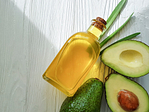Living a vegan lifestyle and determining what is vegan or healthy can be a difficult task. Often, we believe that cooking your food in oil is considered unhealthy. What if I told you that is not always the case?
You do not have to cut out fried foods to maintain a healthy vegan lifestyle. Some cooking oils are not always unhealthy. Some oils even have their health benefits in moderation. Keep reading to learn more about some healthy oils you can use in your vegan diet.
Olive Oil
One of the most common oils, olive oil, can be used to maintain a vegan diet. Olive oil is derived from the oil of olives which contain many health benefits.
Production
This plant-based oil is made by grinding and extracting the oil from the pulp of the plant.
When making olive oil, workers must ensure proper ripening of the fruit to attain the perfect oil. After the fruit has ripened to the desired level, the olives are then ground into a pulp.
Once this paste has been made, the oil is then extracted by chemicals or spinning the oil out of the pulp.
Uses
Olive oil is used in many different traditional recipes around the world. Olive oil works well for recipes like grilling, frying, marinades, sauces, sauteing, dressing, and more.
Some traditional recipes that include olive oil are:
- Salad dressing
- Marinades
- Dipping for bread
- Light frying
- Roasting vegetables
Health Benefits
Like many staple foods in a vegan diet, olive oil is one of the many foods that contain many health benefits. Olive oil is used in things related to traditional and holistic healing methods and can also be used for things such as beauty hacks.
The most common health benefits of olive oil include:
- Lowering blood pressure
- Lowering cholesterol
- Treating diabetes
- Healthier skin and hair
- Reducing inflammation
- Lowering the risks of certain cancers
Avocado Oil
If you have adapted to a vegan lifestyle, you have likely encountered an avocado or two along your journey. One of the most widely used staple vegan foods happens to be the avocado. Did you know that avocados can produce cooking oil?
Production
The production of avocado oil is a similar method used to make olive oil. Producing avocado oil requires additional steps of removing the pit and skin of the fruit.
Once the seeds and skin have been removed from the fruit, the flesh is then ground into a pulp. Then oil is extracted by the use of mechanics or chemicals.
Uses
Avocado oil is used in a variety of different cooking methods. However, since avocado oil has a high smoke point at 520 degrees Fahrenheit, most people use it for high heat preparation methods such as searing or frying.
However, avocado oil has many other uses in cooking and meals like:
- Marinades
- Dressing
- Drizzles for Soups or salads
- Smoothie addition
- Roasting
The ways you can use avocado oil in your diet are truly endless.
Health Benefits
Like the avocado fruit, its oil has many different healing factors for your skin and overall health. avocado oil can also be commonly found in hair products and skin products. Not only does avocado oil make a great meal addition, but it can also do wonders for your health.
Some of the health benefits found in avocado oil are:
- Hydrating the skin
- Aiding in hair health and growth
- Lowering cholesterol
- Lowering blood pressure
- Adding healthy fats into your diet
Using avocado oil in your diet and your health routines may be a great addition to your life.
Coconut Oil
Many people know coconut oil as more of a beauty product. Did you know it can be used in many different recipes on a vegan diet? It is good for your skin and hair, and it also tastes delicious!
Production
We make coconut oil in a few different ways. The three most common methods are expeller-pressed, cold-pressed, and centrifuged. Here is a quick overview of the three methods.
Expeller-Pressed
Expeller-pressed coconut oil comes from expelling and pressing the coconut meat using machines at high heat. Expeller-pressing is one of the most used methods of coconut oil production next to cold-pressing.
Cold-Pressed
We make cold-pressed coconut oil in a similar way to expeller-pressed oil. The most notable difference between the two methods is the use of heat. When producing cold-pressed coconut oil, the coconut meat must not be exposed to high heat before, after, or during the production processes.
Centrifuged
Centrifuged coconut oil is made similarly to avocado and olive oil. The coconut meat is separated and ground into a fine mixture, and its contents get pressed.
We then extract the coconut milk from this mixture and spin the liquid at high speeds to separate the oil from the milk. This process is the most time extensive and expensive way to produce coconut oil; however, it is considered one of the purest forms of coconut oil.
Uses
Coconut oil has many different uses in both cooking and lifestyle needs. However, coconut oil has a relatively low smoke point at 350 degrees Fahrenheit. Coconut oil should not be used for high-heat cooking methods such as frying or searing.
Some of the most commonly used ways of using coconut oil are:
- Sauteing
- Stir-fries
- Butter replacement
- Additions for curries
- Drizzles
- Marinades
Coconut oil can be used in savory and sweet dishes but works great in baked goods!
Health Benefits
Coconut oil’s uses reach much farther than cooking. Most people commonly know coconut oil for its health benefits and not its uses and recipes. Many people use coconut oil for their skin, nails, and hair. There are many other conditions or diseases that coconut oil can also help treat or improve.
Some of the health benefits of coconut oil include:
- Eczema treatment
- Certain cancer prevention
- Psoriasis treatment
- Growth in premature babies
- Weight loss help
- Hair and skin moisturizer (see also ‘Top 5 Best Vegan Body Lotions You Can Buy‘)
- Stress reducer
It is easy to see why many vegans and non-vegans include coconut oil in their lives and diets. The health benefits of coconut oil do not end there; read here to learn more about coconut oil and its many benefits.
Rice Bran Oil
Rice bran oil is an oil that is typically produced in eastern Asian countries. This oil has an incredible array of health benefits and works with many different recipes for a vegan diet.
Production
Rice bran is the outer layer of rice grains. So, rice bran oil comes from the outer part of rice grains. This external layer is known as chaff.
The chaff of each rice grain is then mechanically pressed or squeezed to extracQt the oil. There is also a method of using a chemical solvent to expel the oil from the chaff of the rice grains. Typically, rice bran oil is made by mechanical production processes.
Uses
Rice bran oil is known to have a more nutty flavor than other oils on this list. It also has a high smoke point of roughly 450 degrees Fahrenheit. It can also work by adding flavor to your food and getting in a good sear at high temperatures.
Some of the best ways to use rice bran oil in your vegan diet are:
- Searing
- Frying
- Roasting
- Stir-fries
- Salad dressings
- Baking
Like other oils, rice bran oil has a mildly nutty flavor profile. This makes the oil perfect for dishes of Asian origin.
Health Benefits
Rice bran oil has been used for years among different cultures for its various uses and health benefits. This oil can be great for freshening breath, lowering cholesterol, and even reducing your risk of cancer.
Here are some of the most popular health benefits of rice bran oil:
- Combats bad breath
- Decrease risk of heart disease and type 2 diabetes
- Lower blood pressure
- Incorporate healthy fats into your diet
- Fights inflammation
- Prevents certain cancers
Using this oil in moderation may have positive effects on your health and hygiene. Adding this oil to your diet is a great way to prevent certain diseases and stay healthy.
Grapeseed Oil
Grapeseed oil is a popular cooking oil among home cooks and chefs alike due to its mild flavor profile and high smoke point. Grapeseed oil has a smoke point of around 420 degrees Fahrenheit, which makes it ideal for most cooking methods.
Production
As the name suggests, grapeseed oil is derived from the seeds of grapes. The way this oil is made may come as a surprise, however. Grapeseed oil is extracted during the process of making wine.
After grapes have been pressed for their juices, there are many seeds left behind. These seeds are harvested and pressed further to extract the oils.
Grapeseed oil can also be produced using chemical solvents, but health experts advise against this.
Uses
Since grapeseed oil is so mild and has a high smoke point, it is often considered an all-purpose oil. This means that most of the things you would typically use oils for can also use grapeseed oil.
Some of the most common uses are:
- Pasta sauces
- Baking
- Stir-frying
- Sauteing
- Searing
- Roasting
- Marinades
The possibilities of grapeseed oil are nearly endless in the kitchen.
Health Benefits
When speaking of the health benefits of grapeseed oil, it is crucial to note that many of them tend to aid in the beauty of a person instead of health. Grapeseed oil is high in Omega-6 fats, but experts are still unclear about its health effects.
Currently, most grapeseed oil’s benefits aid with things like skin and hair. Some of the most commonly mentioned beauty benefits are:
- Fight acne
- Moisturize skin
- Combat hair loss
- Fight dandruff
- Moisturize your scalp
- Reduce the appearance of scars
Although health experts do not know the direct benefits or risks of grapeseed oil yet, it can still add many different things to your vegan lifestyle.

Conclusion
All of the vegan cooking oils listed above may be some of the best new additions to your diet and lifestyle. Each of the oils has a wide variety of uses and an even wider variety of benefits.
Many oils are already plant-based and can work great in the kitchen. So, the good news is that most cooking oils are already vegan. The even better news is that most oils can be used interchangebly for many different recipes and uses.
The next time you think about making a meal at home and need to use cooking oil, worry no more! With the correct cooking methods, vegan cooking oils can work wonders in the kitchen.
[thrive_leads id=’11437′]
Sources:
https://www.healthline.com/nutrition/11-proven-benefits-of-olive-oil
https://www.masterclass.com/articles/rice-bran-oil-guide#what-is-rice-bran-oil
https://www.medicalnewstoday.com/articles/318395#next_steps
https://www.netmeds.com/health-library/post/rice-bran-oil-nutrition-extraction-process-health-benefits-for-heart-diabetes-skin-and-side-effects
https://www.webmd.com/diet/rice-bran-oil-good-for-you
https://youtu.be/2etaLsm9ZsA
Share on facebook
Share on pinterest
Share on twitter
About the author
Facebook
Twitter
Instagram
Facebook
Twitter
Instagram
Read these next
- Why is My Poop Black: Uncovering the Causes and Solutions - December 21, 2023
- Clear Protein Drinks: Optimal Hydration and Muscle Support for Athletes and Fitness Enthusiasts - December 21, 2023
- Does Apple Juice Make You Poop: Uncovering the Digestive Effects - November 29, 2023







